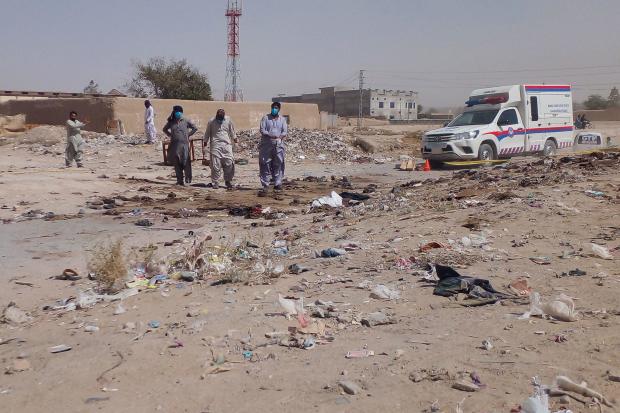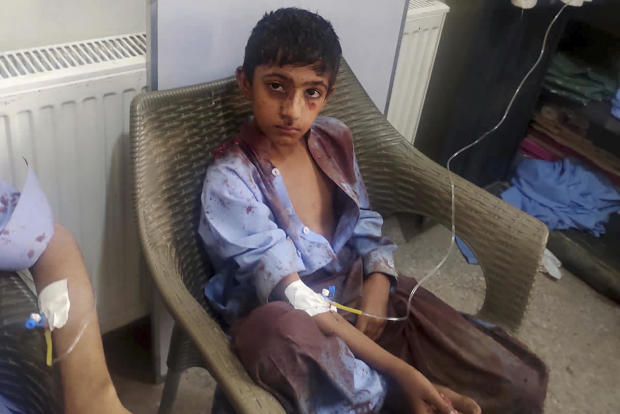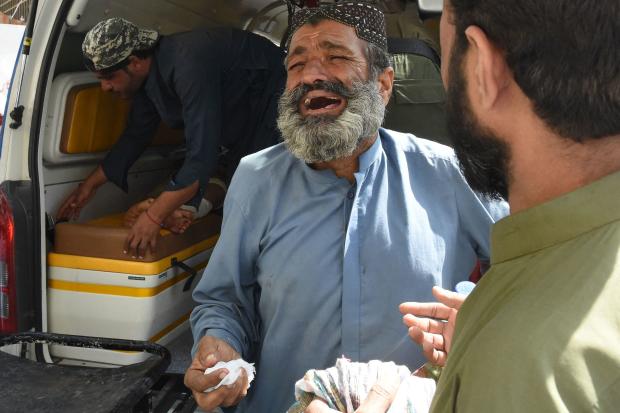Pakistan suicide bombing near mosque in Balochistan kills more than 50 gathered for religious procession
Islamabad, Pakistan — A religious gathering to celebrate the birthday of Islam's Prophet Mohammad turned deadly Friday in Pakistan when a suicide bomber exploded a powerful device near a mosque, killing at least 52 people and leaving some 70 more injured in an attack targeting worshippers and police. Another attack elsewhere in the country, targeting another mosque, left at least 5 people dead.
Local officials said the blast in the Mastung district of Pakistan's southwest Baluchistan province, which has faced a decades-long nationalist rebellion as well as multiple attacks by the ISIS faction in the region, had targeted the procession as worshipers left the mosque.

No group immediately claimed responsibility for Friday's explosion but the Pakistani Taliban, a collection of religious extremist sub-groups that's separate from the Afghan Taliban but closely allied with the group that retook power in Afghanistan in August 2021, denied responsibility.
ISIS-Khorasan, or ISIS-K, a branch of the terror group that operates in Pakistan and Afghanistan, is also active in the province has claimed previous deadly attacks in Baluchistan and elsewhere.
The Baluch nationalists who have fought for years for independence in the oil-rich province bordering Afghanistan and Iran typically target security officials rather than civilians.
Video aired by Pakistani TV stations and posted on social media showed bloodied victims of the explosion and body parts strewn across the site of the blast.

Dr Saeed Mirwani, chief executive of the local Nawab Ghous Bakhsh Raisani Memorial Hospital, told reporters that dozens of casualties were being treated at the facility, while more than 20 more seriously injured victims were sent to the provincial capital of Quetta for more advanced treatment.
"The process of moving bodies and injured persons is under way," the hospital CEO said.
Hours after the suicide blast in Baluchistan province, at least one more explosion ripped through a mosque in Khyber Pakhtunkhwa province, which also borders Afghanistan, killing at least five people, a regional official said. The mosque's roof collapsed in the blast, leaving about 30 to 40 people buried under rubble.
Interim information minister for the provincial government Feroze Jamal said there were two suicide bombers involved in the attack, one who was killed in a shootout with police at the entrance to the mosque in the city of Hangu, and another who then detonated his device inside the building as people gathered to tend to the wounded.
Pakistan's president Arif Alvi condemned both attacks and asked authorities to provide all possible assistance to the wounded and the victims' families.
In a statement, caretaker Interior Minister Sarfraz Bugti denounced the bombing, calling it a "heinous act" to target people in the religious procession.

The government had declared Friday a national holiday to mark Prophet Mohammad's birthday.
The Human Rights Commission of Pakistan said it was "unacceptable that the residents of Baluchistan are compelled to live in constant fear amid deteriorating law and order."
"Those responsible for this heinous attack must be brought to justice. HRCP believes, however, that hyper-securitization will not resolve the security problem in the province," it added in a statement shared on social media.
Soon after news of the explosions in Baluchistan and Khyber Pakhtunkhwa, police in Pakistan's most populous province, Punjab, and in its biggest city Karachi, said they were stepping up security around mosques amid Friday prayers.
Friday's bombing was among the worst attacks in Pakistan in a decade. In 2014, 147 people, mostly schoolchildren, were killed in a Taliban attack on an army-run school in the northwest city of Peshawar.
In late January, more than 100 people were killed, mostly police, at a mosque inside a high-security compound housing the Peshawar police headquarters. In July, at least 54 people were killed when a suicide bomber dispatched by ISIS-K targeted an election rally for a pro-Taliban party in the northwest of the country.
- In:
- Taliban
- Pakistan
- Asia
- Suicide
Disclaimer: The copyright of this article belongs to the original author. Reposting this article is solely for the purpose of information dissemination and does not constitute any investment advice. If there is any infringement, please contact us immediately. We will make corrections or deletions as necessary. Thank you.





